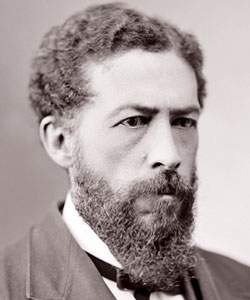John Mercer Langston (Congressional Biographical Directory)
Reference
LANGSTON, John Mercer, a Representative from Virginia; born in Louisa, Louisa County, Va., December 14, 1829; attended the common schools in Ohio; was graduated from the literary department of Oberlin College in 1849 and from the theological department in 1852; studied law in Elyria, Ohio; was admitted to the bar in 1854 and commenced practice in Oberlin, Ohio; took an active part in recruiting black troops during the Civil War, especially for the Fifty-fourth and Fifty-fifth Massachusetts and Fifth Ohio Regiments; member of the council of Oberlin 1865-1867; member of the city board of education in 1867 and 1868; appointed inspector general of the Bureau of Freedmen, Refugees, and Abandoned Lands in 1868; moved to Washington, D.C., and practiced law; dean of the law department of Howard University 1869-1876; appointed and commissioned by President Grant a member of the Board of Health of the District of Columbia in 1871; appointed by President Hayes Minister Resident and consul general to Haiti and Chargé d’Affaires to Santo Domingo; elected vice president and acting president of Howard University in 1872; delegate to the Republican National Convention in 1876; returned to Virginia, having been elected president of the Virginia Normal and Collegiate Institute, Petersburg, Va., in 1885; delegate to the Republican State convention in 1890; successfully contested as a Republican the election of Edward C. Venable to the Fifty-first Congress and served from September 23, 1890, to March 3, 1891; unsuccessful candidate for reelection in 1890 to the Fifty-second Congress; died in Washington, D.C., on November 15, 1897; interment in Woodlawn Cemetery.
"Langston, John Mercer," Biographical Directory of the United States Congress, 1774 to Present, http://bioguide.congress.gov/scripts/biodisplay.pl?index=L000074.
John Mercer Langston (American National Biography)
Scholarship
In 1856 the Langstons began a fifteen-year residency in Oberlin. Elected repeatedly to posts on the town council and the board of education, he solidified his reputation as a competent public executive and adroit attorney. In his best-known case, Langston successfully defended Edmonia Lewis, a student accused of poisoning two of her Oberlin classmates (who recovered); Lewis would become the first noted African-American sculptor. In promoting militant resistance to slavery, Langston helped stoke outrage over the federal prosecution under the Fugitive Slave Law of thirty-seven of his white and black townsmen and others involved in the 1858 Oberlin-Wellington rescue of fugitive slave John Price. Immediately, Langston organized the new black Ohio State Anti-Slavery Society, which he headed, to channel black indignation over the case. While his brother Charles Henry Langston, one of the two rescuers convicted, repudiated the law in a notable courtroom plea, Langston urged defiance of it in dozens of speeches throughout the state. Langston supported the plan by John Brown (1800-1859) to foment a slave uprising, although he did not participate in the 1859 raid on Harpers Ferry. Following the outbreak of the Civil War, once recruitment of northern black troops began in early 1863, he raised hundreds of black volunteers for the Massachusetts Fifty-fourth and Fifty-fifth regiments and for Ohio's first black regiment.
William Cheek and Aimee Lee Cheek, "Langston, John Mercer," American National Biography Online, February 2000, http://www.anb.org/articles/05/05-00419.html.



